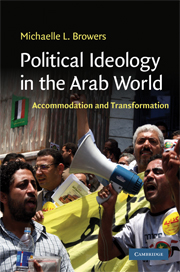Book contents
- Frontmatter
- Contents
- Acknowledgments
- Glossary
- Introduction: Ideological thought and practice in the Arab region
- 1 Retreat from secularism in Arab nationalist and socialist thought
- 2 A more inclusive Islamism? The wasatiyya trend
- 3 Framing a cross-ideological alliance
- 4 The Egyptian Movement for Change: Intellectual antecedents and generational conflicts
- 5 Yemen's Joint Meeting Parties: Origins and architects
- Conclusion: Ideological rapprochement, accommodation, transformation – and their limits
- Bibliography
- Index
- Cambridge Middle East Studies
Conclusion: Ideological rapprochement, accommodation, transformation – and their limits
Published online by Cambridge University Press: 22 January 2010
- Frontmatter
- Contents
- Acknowledgments
- Glossary
- Introduction: Ideological thought and practice in the Arab region
- 1 Retreat from secularism in Arab nationalist and socialist thought
- 2 A more inclusive Islamism? The wasatiyya trend
- 3 Framing a cross-ideological alliance
- 4 The Egyptian Movement for Change: Intellectual antecedents and generational conflicts
- 5 Yemen's Joint Meeting Parties: Origins and architects
- Conclusion: Ideological rapprochement, accommodation, transformation – and their limits
- Bibliography
- Index
- Cambridge Middle East Studies
Summary
This book presents analysis of the intellectual and historical antecedents of contemporary cases of cross-ideological coordination among various oppositional elements that have traditionally opposed each other. As such, it responds to those who think that the spontaneity and often haphazard protest activity in the streets of Cairo and the surprising formalization of a socialist-Islamist opposition bloc in Sana'a lack antecedents, lack thinking, lack constructive political programs, and lack political (or ideological or intellectual) significance. The origin, character, and significance of these instances of contentious politics is only revealed through fuller examination of the individuals, trends, and groups that have instigated and justified these alliances, and undertaken the intellectual groundwork that contributed to their emergence.
1) Origins: what are the circumstances that have brought historical rivals together? While certainly particular political, economic, social, and other material conditions contributed to the emergence of the current wave of protest politics in Egypt and the oppositional bloc in Yemen, there is a tendency to see the actions as merely reactive: merely the result of electoral disputes, or a response to events in the Palestinian–Israeli conflict, or as a result of the Bush administration's Greater Middle East Initiative, or as a reaction to globalization. Certainly this is part of the story. However, consideration of the intellectual antecedents, of increased willingness of ideological foes to reconsider and reformulate their perspectives, of the considerable dialog and ijtihad undertaken that predate the particular events and policies these groups and individuals ally to address, and of the ideological and conceptual framework of the construct, are an equally essential part of the story.
- Type
- Chapter
- Information
- Political Ideology in the Arab WorldAccommodation and Transformation, pp. 175 - 179Publisher: Cambridge University PressPrint publication year: 2009



